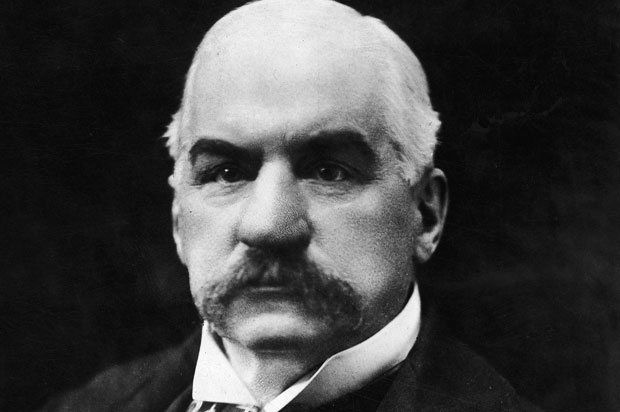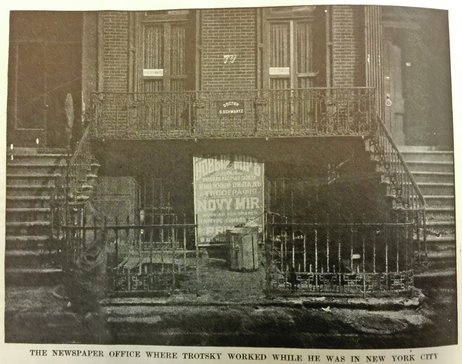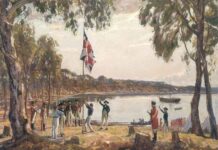
From Patriotic Alternative.
By Titus Domitian
Many of us are aware of the Cold war, how it is “over” and how we are living in “the end of history”[1], the US and West European way of life have won (at least economically) and now the ghosts of communism have been laid to rest. So why is it, a full 30 years on since the supposed abolition of the first communist state and the greater Soviet empire succumbing to its own ineptitude and the gradual entropy that communism has, why do we see open communist speakers on our mainstream shows, not-so-open communist members of a scientific advisory board have influence in government, our own foreign ministry Kowtowing to the economic political might of China (nominally communist). So, what’s going on? Are the communists defeated or not?
As incredible as it might seem, the Communist revolution was partly organised, aided and directed from Wall-Street.
However, before the story of the betrayal of the West is spoken about, let’s look at the timeline of events that led to the position in which this betrayal was made possible.
Nineteenth century origins
After Karl Marx completed Das Kapital and the ideas of communism were spread into all corners of Europe, the spectre of communism began to hover over the established Kingdoms and republics of Europe. Russia famously tried to stamp it out with brutal methods, which only emboldened the spread of communism. In Germany, France and the UK, socialist parties and socialist reforms began to be passed in law, Bismarck’s famous welfare reforms, the abandonment of free trade, the gradual emancipation of non-landowning freemen, the lowering of the voting age- all the ideas pushed by communist thinkers. Even as Europe lay claims to Africa after the conclusion of the Russo-Turkish war in the late 19th century, Imperialism and Capitalism did not look like they were going anywhere and would not be ousted by Communist forces.
Nothing, however, would threaten capitalism and liberalism like the champion of capitalism and liberalism: The United States of America.
In the United States, a similar story of late 19th century prosperity emerged. After the reconstruction of the US after the Civil War, the overall wealth of the US began to gradually improve- rapid industrialisation, the growth of new cities, the consolidation of powerful financial and industrial elites in the East Coast emerged. The names of these groups should be familiar to anyone with even a passing interest in financial history: The Rockefellers, Carnegies, The Rothchilds and J.P Morgan, who later merged with Chase. All of these groups used the extra spending of the Lincoln Administration in the Civil war to further their power, now they were powerful enough to buy off congressmen and senators- so notoriously powerful was the group that an entire political movement, progressivism, was born to stop the influence of money in politics.

This progressive movement entirely failed in its objective and soon became a vehicle to transform the last independent vestiges of both the Democratic and Republican parties into organisations that would serve power- the very same financial power that now stood poised to claim the political powers of Washington.
In this, they found a man willing to forever change the US and set the course for the style of administration and exporting of revolution and use of brutal financial power: Woodrow Wilson.
A big lie
The formulaic history books of the United States will tell the reader that Woodrow Wilson made every conceivable effort he could to not involve the US into the European conflict, only forced through the Zimmerman telegram and the resumption of unrestricted submarine warfare by the Germans. He even ran a successful second term re-election on the slogan “He Kept us out of war” in 1916, 2 years into the bloody First World War being fought in (mostly) Europe. What the public then and the reader of history now won’t know is that this was a bold-faced lie. Woodrow Wilson was well-aware of the war in Europe, mostly through Colonel House, his aide. Owing his position to the powerful industrial and financial backers in Wall-Street, the President would serve their interests well.
In this, the President and the syndicate were served by a momentous event that occurred in the 1910s: The Communist revolution.
The communist revolution of Russia is well-documented, but even today the most someone will tell you about the conspiracy of the communist revolution is that the military government of Germany in the First World War used secret funds to get Lenin from Switzerland to Russia to take the latter out of the war and overthrow the democratic government of Russia that had replaced the Czar’s autocratic rule.
This is true, but what few can tell you is that a much more impactful and well-resourced communist coup was orchestrated from Wall-Street.
Trotsky: From Exile to World-shaker
In 1916, things must have seemed bleak for Leon Trotsky. Writing in Paris for a pro-Soviet paper had gotten him in trouble with the authorities, still allied to the Russian Tsarist government fighting Germany and Austria on the Eastern front, and consequently had resulted in his banishment to Spain. Spain too, perhaps worried about its status as a neutral country in the war, hurried to remove Trotsky far away from Europe and placed on a ship bound for New York city.
Trotsky, who spoke only German and Russian, must have found this daunting- thousands of miles away from where he was trying to affect a revolution, in the bastion of dreaded capitalism and without a secure income or possibility to know his future, the communist revolution could have stopped in its tracks right there.
However, we know from history that this is not the case, so how did Trotsky not only survive, but grow in strength to return to Russia and help direct its revolution? The answer is simple, but shocking: Trotsky enjoyed the political support of the United States government.
 In his autobiography, Trotsky said he gave his $310 to five fellow revolutionaries by the time he arrived in the US. Yet it is known that Trotsky lived in a well-furbished apartment, with refrigeration and a telephone connection, a chauffeur to drive him to destinations and to give him opportunities to speak as a guest lecturer. What is also known is that the Canadian authorities in Halifax later detained Trotsky before he had set off to Russia with $10,000 sourced from German high command and revolutionaries (inflation being what it is, that money today is the equivalent of just shy of $250,000).
In his autobiography, Trotsky said he gave his $310 to five fellow revolutionaries by the time he arrived in the US. Yet it is known that Trotsky lived in a well-furbished apartment, with refrigeration and a telephone connection, a chauffeur to drive him to destinations and to give him opportunities to speak as a guest lecturer. What is also known is that the Canadian authorities in Halifax later detained Trotsky before he had set off to Russia with $10,000 sourced from German high command and revolutionaries (inflation being what it is, that money today is the equivalent of just shy of $250,000).
There can be no dispute that the reason for the return of Trotsky from the United States back to Russia was done by President Wilson who provided an American passport for Trotsky to leave, well-aware of who he was. [2] Using the US neutrality and claiming Trotsky was an American citizen, this gave Trotsky a method of returning to Russia unimpeded.
Trotsky was not only allowed to use a US passport, but was also expedited from prison when he was briefly detained by the Canadian authorities in Halifax, Canada. The Canadians were understandably nervous about allowing such a man into Russia when they were so keen to keep the Kerensky-led Russian government on side and in the war. However, as soon as Trotsky’s detainment was made known to the US authorities, pressure was applied to release him as soon as possible.
Evidence of a New York attorney, Nicholas Aleinkoff, writing the Canadian post-master to release the revolutionaries. It should be asked, what conceivable reason would a lawyer in America have for dealing with internment of Russian exiles in Canada and to put pressure on the Canadian authorities to release the men? Eventually, they did, for reasons that are not entirely clear, but the reader should note the shared ethnic-religious background of these men as possible motive for their speedy release. At the very least, it shows conspiracy to not only use the US neutrality to their advantage, but to betray the war policy of the Allies.
Belatedly, the Russian government complained and insisted on restricting revolutionaries coming back to Russia, but the damage done by the released revolutionaries would prove too great.
Trotsky would later claim, following the communist revolution, that an alliance with the US was “impossible” because of the US being a “bourgeois nation”, but then ask for US help in building the infrastructure of Russia.
International conspiracy
There is no smoking gun of well-documented minutes of men meeting in smoke-filled backrooms of skyscrapers discussing how they would conquer the world through revolution, but there is a consistent pattern of documented events that lead to the credible suggestion that an international conspiracy used the US to affect revolution in Europe.
There are, however, many names and many connections that repeatedly show up and show not only knowledge, but also collusion with revolutionary forces on the foreign stage using the power of US finance and political might. Charles B Hill, secretary for a New York based banking syndicate who would later go onto finance the Bolsheviks in Russia, notably through the Westinghouse bank set up in Russia, aided by Charles Crane of the Crane company. According to William Dodd, the US ambassador to Germany in the 1930s, writes in his diaries that Crane was “instrumental in fermenting revolution in the Kerensky government”.
Then there’s Olof Aschberg, founder of Nya Banken in 1912. In 1918, this bank was placed on a blacklist by the Allies as a front for laundering money to the Germans, but it seems that Aschberg was also using it as a means to fund the Bolsheviks in Russia. Indeed, he eventually gained the nickname “The Bolshevik Banker”. In 1916, he was raising $50m for the Russian cause, but gave an interesting quote where he says:
“The opening for American capital and American initiative, with the awakening [My italics] brought by the war, will be country-wide when the struggle is over. There are now many Americans in Petrograd, representatives of business firms, keeping in touch with the situation, and as soon as the change comes a huge American trade with Russia should spring up”. [3]
What “awakening” Olof Aschberg refers to, given his documented work with the Bolsheviks, can be inferred to be is the Communist revolution, but does this quote give a hint as to what the US syndicate wanted from the Communist revolution: primary access to the wealth and capital of Russia? Perhaps.
Certainly, some would like to see a country and government they helped create beholden to their interests as means of bleeding that nation dry of wealth. Perhaps this is done on an ideological basis, perhaps this is part of a wider conspiracy that would involve a shared connection of Trotsky, Acheberg, Hill, Wilson and many, many others. Again, the reader should make up their own judgement.
Closing thoughts
History is full of both little and big “what-ifs”, but this hardly talked-about event must rank as one of the highest. Trotsky’s legacy will be written in bloody characters in the pages of European history, his work in the criminal Soviet government of Lenin and efforts to spread the international revolution would spell misery for the peoples of Russia and Eastern Europe.
Were Trotsky detained and imprisoned and left to languish in a Canadian jail, millions could have been spared. However, the forces of international finance and international communism combined and used the raw political and financial power of the US to ensure he was free to do his evil.
This should be remembered whenever you read the centrist/libertarian/conservative/communist narratives on history: the US president and the financial power of Wall-Street aided and funded the communist takeover of Russia for the benefit of US financial power and Soviet political power.
[1] The End of History?, Francis Fukuyama
[2] U.S. State Dept. Decimal File, 316-85-1002.
[3] New York Times, August 4, 1916.










